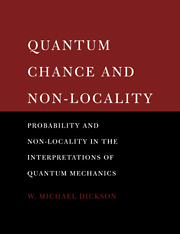 Quantum Chance and Non-locality
Quantum Chance and Non-locality Book contents
- Frontmatter
- Contents
- Preface
- Acknowledgement
- Part one Quantum chance
- Part two Quantum non-locality
- 6 Non-locality I: Non-dynamical models of the EPR–Bohm experiment
- 7 Non-locality II: Dynamical models of the EPR–Bohm experiment
- 8 Non-locality and special relativity
- 9 Probability and non-locality
- Notes
- References
- Index
6 - Non-locality I: Non-dynamical models of the EPR–Bohm experiment
Published online by Cambridge University Press: 11 September 2009
- Frontmatter
- Contents
- Preface
- Acknowledgement
- Part one Quantum chance
- Part two Quantum non-locality
- 6 Non-locality I: Non-dynamical models of the EPR–Bohm experiment
- 7 Non-locality II: Dynamical models of the EPR–Bohm experiment
- 8 Non-locality and special relativity
- 9 Probability and non-locality
- Notes
- References
- Index
Summary
We now have under our belts several interpretations of quantum mechanics, each requiring, or anyhow advocating, some understanding of quantum probabilities. In the next two chapters, I will consider some connections among various interpretations of quantum probabilities and non-locality. I do so in the context of the well-known EPR–Bohm experiment, though it is worth emphasizing at the start that non-locality is very likely the rule rather than the exception for quantum-mechanical systems. Entanglement of systems occurs not only in the confines of a laboratory, but also in the course of quite typical interactions among quantum-mechanical systems.
Nonetheless, the EPR-Bohm experiment shines a bright light on the phenomenon of non-locality, and is therefore the most useful context in which to explore the relation between probability and non-locality. In this chapter, I consider models of the EPR–Bohm experiment that deliver probabilities for the various outcomes given the initial state of the pair of particles. In the next chapter, I consider fully dynamical models, i.e., ones that provide a dynamics for the complete state of the pair of particles as well as probabilities for various outcomes based on these complete states.
The EPR–Bohm experiment
The EPR–Bohm experiment is well known, but some observations about it are important for later.
- Type
- Chapter
- Information
- Quantum Chance and Non-localityProbability and Non-locality in the Interpretations of Quantum Mechanics, pp. 129 - 146Publisher: Cambridge University PressPrint publication year: 1998


